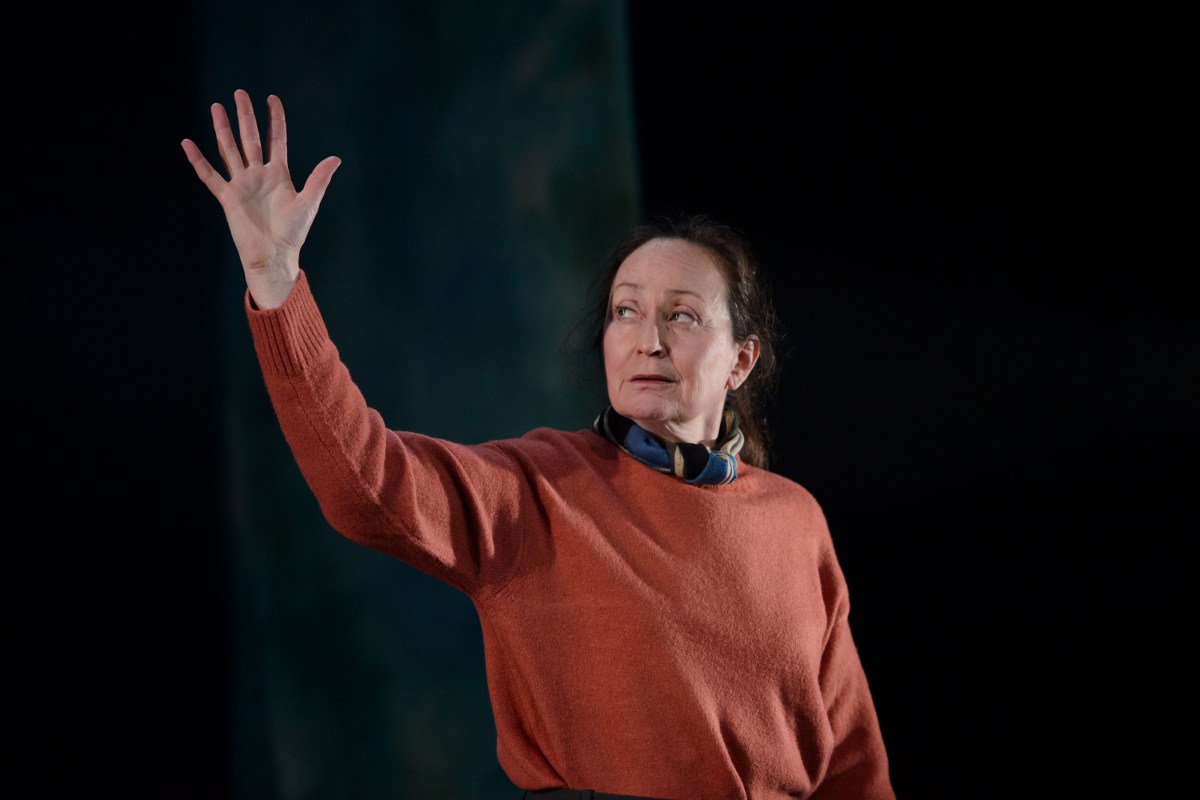One definition of the name June is that it’s derived from Juno, the Roman goddess deemed to protect marriage and childbirth. Often shown armed and draped in a goatskin cloak, Juno was also noted by the Romans for her warlike aspects. In another telling, the etymology of June is related to the Latin word for “young”.
It’s possible to glimpse each of these origin stories in Patrick McCarthy’s one-woman monologue June. It tells the story of the middle-aged titular character as she meanders towards an explanation for choosing not to speak for more than a year. We guess, as we are intended to, that some terrible event has precipitated June’s silence, and over the course of 70 minutes the monologue unspools into a denouement both haunted and haunting.
We learn much about June. She was married to a man named Sam, whom she met on a beach (she just liked his face, she tells us). They collected glass bottles and filled one room of their house with them. Together they had three children, a son and two daughters, both of whom live abroad. She is independently wealthy and spends a lot of time in the forest. Her mother, spoken of, as with much else, in the past tense, became sick with a progressively debilitating illness June will not name as though to deprive it of its awful power.
When June tells us that it has been easy for her not to speak, she means I suspect that this is because women – especially ones who are no longer young – are already silenced in our society. Woven among these often-nostalgic autobiographical details are wry, sometimes melancholic observations about life and the cosmos. Some take a metaphysical turn; others, usually non sequiturs, are disarmingly earthly.
We also learn that she is an unreliable narrator. Important pieces of information are omitted only to be guiltily revealed when the advancement of her narrative depends on it. We, the audience, are also subtly implicated in June’s garrulous elisions. There is no fourth wall here, and our relationship with her feels suspended between best friend, priest and bar room stranger. June sees us, and thanks us for our attention. She asks questions of us that, just for a moment, feel requiring of an answer. She seeks to beguile us into the role of confidant – and she does – but she is also aware of when she can take a risk with the sense of trust she has built.
In lesser hands, the conceit of June – a play about silence comprising an awful lot of talking – may have proven a tiresome gimmick. McCarthy, however, more than redeems the idea with a text that, while a touch overwritten in places, is for the most part a joy to hear, and amounts to a deeply moving meditation on what might with less craft have felt like overworked themes – love, loss, connection and the unknowability of the human heart.
It’s a testament to the quality of the script (dramaturged by Morgan Rose) that, even while the catalyst for June’s silence – when it is finally disclosed – feels somehow a mismatch for the stakes that have been established, its emotional power remains largely undimmed. Impressive, too, is McCarthy’s ability to work in feminist and other kinds of social commentary without sermonising. The particular is – for a change it seems these days – allowed to speak for the universal, rather than the other way about.
Caroline Lee is masterful as June. Dressed sensibly in a jumper, slacks and trainers, her presence is warm but brittle, a sort of embodiment of the chain of intimacy, vulnerability and the pain she describes at one point. There is something birdlike about Lee, skittish but wise, and at ease in her own body. She fills the space without dominating it, a dance lent an expansive but fine-drawn physicality by movement consultant Devika Bilimoria. We feel, at every turn, the weight of June’s grief and alienation, but it is never belaboured. When Lee tells us, her fingers wedging her eyelids open, that even the pupils and irises can reveal our agedness, it is hard not to believe her.
The monologue form, I’ve always thought, requires something special of directors and designers, an approach that balances faith in the text and performer to carry a work’s meaning and feeling with an attention to the ways in which the mise en scene can amplify rather than intrude on the play’s effects. In this, Emily Tomlins’ direction and Zoe Rouse’s design – three narrow, floor-to-ceiling drapes surrounding a series of gravestone-like blocks – are almost entirely successful. Lisa Mibus’ lighting design is similarly excellent, its chiaroscuro, haze-drenched atmospherics lending the production a suitably oneiric quality.
Read: Book review: The Hummingbird Effect, Kate Mildenhall
In June’s perceived failure to, as per her Roman namesake, safeguard her marriage and children, lies her undoing. In the end, speech, as it so often does in times of existential crisis, almost entirely evades her. Instead, she feels herself back into her body – ageing, unregarded – and dances what cannot, will not be said. The choreography here feels both defiant and longing – a shove and a hug. One arm outstretched, the other seeming to strum her chest, June might be playing a lute or a guitar. The body, of course, has its own language, its own music, and this production rings with it.
June by Patrick McCarthy
Fabricated Rooms
Theatre Works
Director: Emily Tomlins
Dramaturgy (text): Morgan Rose
Designer: Zoe Rouse
Lighting Design: Lisa Mibus
Sound Design: Jess Keefe
Stage Management: Rosemary Osmond
Movement Consultant: Devika Bilimoria
Performer: Caroline Lee
Tickets: $20-$45
June will be performed until 5 August 2023.





